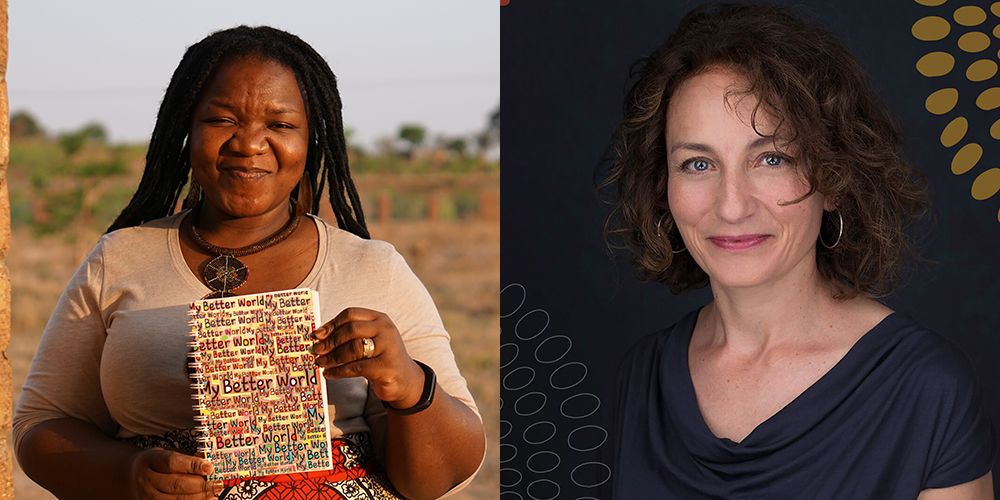

Faculty research partner CAMFED awarded 2020 Yidan Prize for Education Development

Angeline Murimirwa, CAMFED’s Executive Director - Africa (left), and Lucy Lake, CAMFED’s Chief Executive Officer, are 2020 laureates of the Yidan Prize for Education Development, the world’s largest prize in education.
Angeline Murimirwa, CAMFED’s Executive Director - Africa (left), and Lucy Lake, CAMFED’s Chief Executive Officer, are 2020 laureates of the Yidan Prize for Education Development, the world’s largest prize in education.
The Campaign for Female Education (CAMFED), whose work to improve the education of marginalised girls in Africa has been supported through a research partnership with the Faculty, has been awarded the world’s largest prize in education.
CAMFED is the 2020 recipient of the Yidan Prize for Education Development, an international award recognising outstanding commitment to education transformation. Angelina Murimirwa, CAMFED’s Executive Director in Africa, and Lucy Lake, Chief Executive Officer, accepted the award on behalf of the organisation earlier today. They are the first team to be granted the Yidan Prize since its inception in 2017.
The Prize represents a profound endorsement of CAMFED’s community-led model for girls’ education. CAMFED is a pan-African movement that aims to help more women receive a high-quality education, and through this to unlock a far wider range of positive social and economic effects: addressing child and maternal mortality, helping families to raise themselves out of poverty, supporting economic development and encouraging positive action on climate change. To date, it has supported more than 4.1 million children to go to school in Ghana, Malawi, Tanzania and Zimbabwe.
Behind the scenes, CAMFED’S work has been aided by Faculty of Education research. Over the last four years, the Faculty’s Centre for Research for Equitable Access and Learning (REAL) has undertaken extensive work to provide an independent assessment of, and evidence base for, CAMFED’s programmes. Through the CAMFED-REAL partnership, Centre members have gathered and analysed evidence about how best to support the very poorest and most marginalised girls, how such programmes can be made cost-effective, and how they can be sustained.
REAL’s research has focused on the organisation’s work in Tanzania in particular. By comparing the learning outcomes of girls supported by CAMFED in government secondary schools with those of girls who are not, it has shown that those who receive bursaries from the organisation are 30% more likely to stay in education, and that children in CAMFED-supported schools on average triple their assessment scores compared with those in other schools. The same study shows that CAMFED’s programme, while costing more up-front, also achieves significant value for money when its impact is considered beyond learning gains alone, including keeping the most marginalised girls in school. Overall, the improvement in access and learning is equivalent to an additional two years of schooling for all girls and boys per $100.
Collectively, the research has highlighted the need for multi-dimensional approaches to overcome inequalities in secondary education. It further shows that education systems that give particular attention to supporting the most marginalised benefit all children. This evidence base has generated tangible benefits, enabling CAMFED to raise £18 million in funding to benefit more than 51,000 marginalised children at secondary school, including 16,200 of the most marginalised girls.
The award of the Yidan Prize recognises, in particular, CAMFED’s Learner Guide Programme, through which young women leaders who have themselves benefited from the organisation’s support design and deliver programmes to help other girls in their communities.
The programme remains one of several examples of how CAMFED has been able to offer a scalable, replicable and inclusive approach to tackling some of the challenges to girls’ education in sub-Saharan Africa. It will also be scaled up thanks to the Yidan Prize, which will be used to support the training of 20,000 Learner Guides, who in turn will support one million adolescent girls in school – a major step to the organisation’s longer-term goal of supporting five million girls in education.
Professor Pauline Rose, Director of the REAL Centre said: “For CAMFED to have been honoured with this award is wonderful news and richly deserved.“
“We know it is not enough simply to get more children around the world into school – those efforts also have to make a lasting, measurable difference once they are there. One of the great things about CAMFED is that they have continually managed and refined their approach to supporting girls’ education by assessing what works best, why, and how it can be maintained. The real thrill of them getting this award is that we know from our research it will help them to make even more of a difference to young women in some of the world’s poorest communities, unlocking opportunities and outcomes that we can measure – and countless others that we can’t.”
For further information about the 2020 Yidan Prize, visit: https://yidanprize.org/